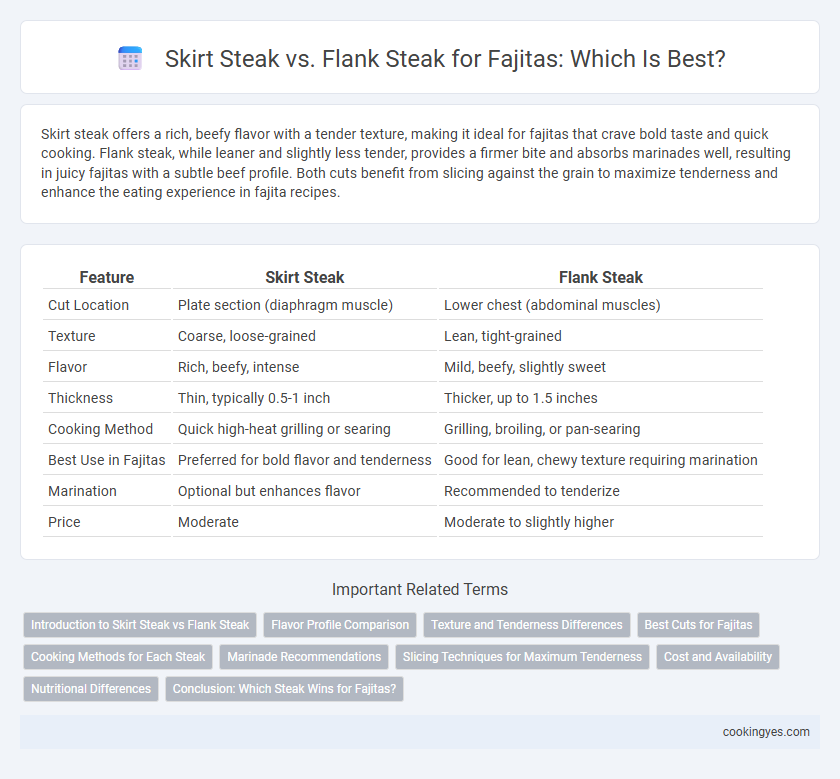Skirt steak offers a rich, beefy flavor with a tender texture, making it ideal for fajitas that crave bold taste and quick cooking. Flank steak, while leaner and slightly less tender, provides a firmer bite and absorbs marinades well, resulting in juicy fajitas with a subtle beef profile. Both cuts benefit from slicing against the grain to maximize tenderness and enhance the eating experience in fajita recipes.
Table of Comparison
| Feature | Skirt Steak | Flank Steak |
|---|---|---|
| Cut Location | Plate section (diaphragm muscle) | Lower chest (abdominal muscles) |
| Texture | Coarse, loose-grained | Lean, tight-grained |
| Flavor | Rich, beefy, intense | Mild, beefy, slightly sweet |
| Thickness | Thin, typically 0.5-1 inch | Thicker, up to 1.5 inches |
| Cooking Method | Quick high-heat grilling or searing | Grilling, broiling, or pan-searing |
| Best Use in Fajitas | Preferred for bold flavor and tenderness | Good for lean, chewy texture requiring marination |
| Marination | Optional but enhances flavor | Recommended to tenderize |
| Price | Moderate | Moderate to slightly higher |
Introduction to Skirt Steak vs Flank Steak
Skirt steak and flank steak are both popular choices for fajitas due to their rich flavor and texture. Skirt steak is known for its long, thin grains and intense beefy taste, while flank steak offers a leaner cut with a slightly tougher bite that becomes tender when marinated and properly cooked. Understanding the differences in texture and flavor between skirt and flank steak helps achieve the perfect fajita experience.
Flavor Profile Comparison
Skirt steak offers a bold, beefy flavor with rich marbling that enhances juiciness, making it ideal for fajitas with a robust taste. Flank steak has a leaner profile with a slightly sweet, savory flavor and a firmer texture, providing a more subtle beef taste. Both cuts benefit from marination, but skirt steak's pronounced fattiness delivers a more intense flavor experience in fajita dishes.
Texture and Tenderness Differences
Skirt steak offers a more pronounced grain and slightly chewier texture compared to flank steak, making it ideal for fajitas when a robust bite is desired. Flank steak features a leaner, tighter muscle structure that is thinner and more tender when properly marinated and sliced against the grain. Both cuts excel in fajitas recipes but require careful cutting techniques to enhance tenderness and flavor.
Best Cuts for Fajitas
Skirt steak and flank steak are both popular cuts for fajitas due to their rich flavor and ideal texture for grilling. Skirt steak is prized for its intense beefy taste and loose grain, which absorbs marinades well and cooks quickly over high heat. Flank steak offers a leaner option with slightly less fat but delivers a tender bite when sliced thin against the grain, making both cuts excellent choices depending on your preference for tenderness and flavor intensity.
Cooking Methods for Each Steak
Skirt steak benefits from high-heat, quick cooking methods such as grilling or pan-searing to preserve its tenderness and enhance its rich, beefy flavor, making it ideal for fajitas. Flank steak requires marinating to tenderize the lean muscle fibers and is best cooked over medium-high heat, either grilled or broiled, then sliced thinly against the grain to maximize juiciness. Both cuts excel when rested briefly after cooking to allow the juices to redistribute, ensuring optimal texture and taste.
Marinade Recommendations
For fajitas, skirt steak and flank steak both benefit from marinades that enhance tenderness and flavor, typically featuring acidic ingredients such as lime juice or vinegar to break down muscle fibers. A marinade combining olive oil, garlic, cumin, chili powder, and fresh cilantro complements the rich, beefy profile of skirt steak, while flank steak thrives with a mixture of soy sauce, lime juice, brown sugar, and smoked paprika to balance its lean texture. Marinating for at least 2 to 4 hours allows the flavors to penetrate deeply, ensuring a juicy and flavorful fajita experience.
Slicing Techniques for Maximum Tenderness
Skirt steak and flank steak require different slicing techniques to maximize tenderness in fajitas. For skirt steak, slicing against the grain into thin strips unlocks tenderness and enhances juiciness due to its looser muscle fibers. Flank steak benefits from slicing thinly against the grain as well, but cutting at a slight diagonal creates shorter muscle fibers, resulting in a more tender bite ideal for fajita preparation.
Cost and Availability
Skirt steak is generally more affordable and easier to find in most grocery stores compared to flank steak, making it a popular choice for fajitas on a budget. Availability of skirt steak is higher due to its frequent use in Mexican and Tex-Mex cuisines, whereas flank steak is often marketed for grilling and may be priced slightly higher. Both cuts offer great flavor, but skirt steak's cost-effectiveness and widespread availability make it a preferred option for fajita recipes.
Nutritional Differences
Skirt steak contains higher fat content, providing a rich, juicy flavor ideal for fajitas, while flank steak offers a leaner profile with fewer calories and less fat, making it a healthier choice. Both cuts are excellent sources of protein, iron, and B vitamins, but flank steak is lower in cholesterol and saturated fat. Choosing between skirt and flank steak depends on balancing taste preferences with nutritional goals in fajita preparation.
Conclusion: Which Steak Wins for Fajitas?
Skirt steak wins for fajitas due to its superior marbling and tender texture, which absorbs marinades better and enhances flavor. Flank steak is leaner and firmer, making it a good alternative but often less juicy. For authentic, flavorful fajitas, skirt steak remains the preferred choice among chefs and grill enthusiasts.
Skirt Steak vs Flank Steak for fajitas Infographic

 cookingyes.com
cookingyes.com